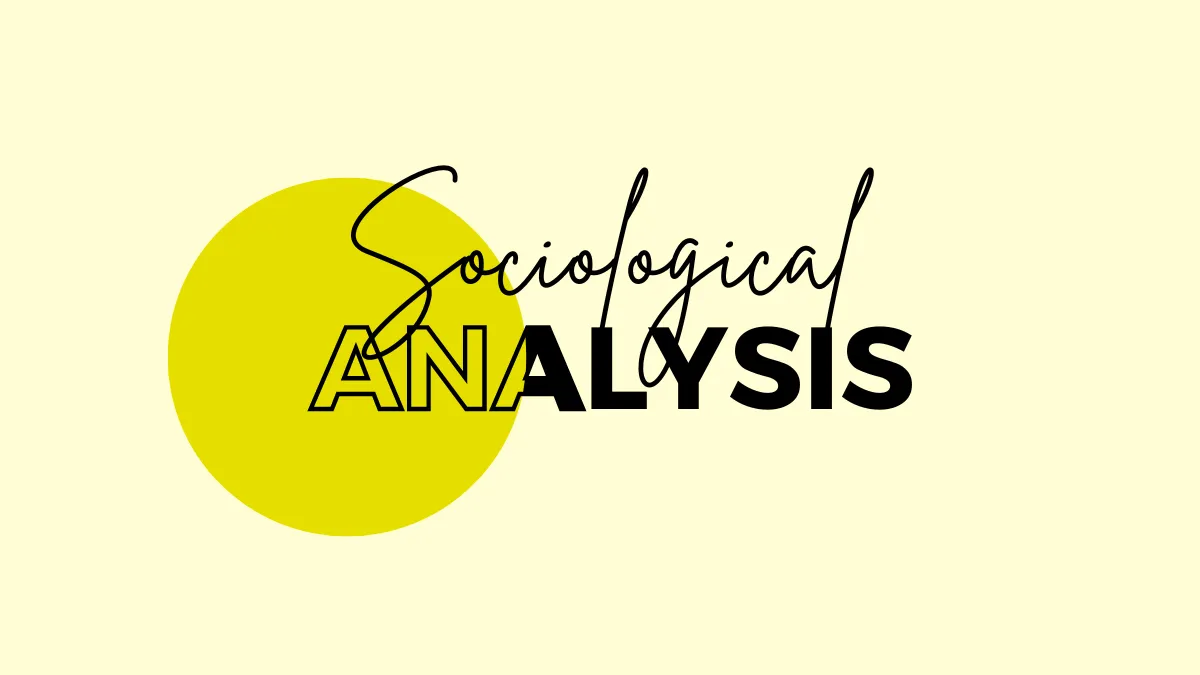Sociological analysis is a method of studying society and social interactions to understand their patterns, processes, and impacts on individuals and groups. It involves a critical examination of social phenomena and their underlying structures, including social norms, beliefs, institutions, and power relations. Sociologists use a variety of methods, including observation, surveys, interviews, and statistical analysis, to collect and analyze data on social behavior and social trends.
Sociological analysis is a valuable tool for understanding the complexities of contemporary society and the social issues that affect our lives. By examining social interactions, sociologists can gain insight into the factors that shape our behavior and attitudes, including social class, race, gender, sexuality, and culture. For example, sociologists have analyzed patterns of discrimination in the workplace or examine how cultural beliefs and values influence attitudes toward mental health.
Examples of Sociological Analysis
Sociologists analyze a variety of social patterns and dynamics through sociological analysis. Some examples include the analysis of social inequality, social change, and other social phenomena.
Analyzing Social Inequality
One important area of sociological analysis is the study of social inequality. Sociologists are interested in understanding how social inequalities are created, maintained, and reproduced over time. Potential topics include inequalities in income, education, health, and political power. For example, sociologists have studies the ways poverty affects access to healthcare, or how race and gender influence earnings in the labor market.
Analyzing Social Change
Another important area of sociological analysis is the study of social change. Sociologists are interested in understanding how societies change over time and the factors that contribute to those changes. This might involve studying the impact of new technologies on social interactions, or how social movements can transform social norms and institutions. In fact, sociologists have studied the impact of the #MeToo movement on attitudes toward sexual harassment in the workplace.
Analyzing Social Phenomena
Sociological analysis can also be used to examine social phenomena more generally that are often taken for granted or normalized in society. For example, sociologists examine the social construction of gender and how gender roles are created and enforced through social norms and institutions. Similarly, sociologists are also interested in the social construction of race and how racial identities are shaped by social and historical processes.
Key Features of Sociological Analysis
Sociological analysis of inequalities, social chance, and other various social phenomena all share a few key features in common. These key features are present in every sociologists toolbox, enabling them to use sociological analysis to uncover hidden truths about our social world. Below, I share the key features that make sociological analyses the powerful tool that they are.
Social Context
Sociological analysis focuses on understanding social phenomena within their broader social, cultural, and historical contexts. It examines the ways in which social factors such as social class, gender, race, ethnicity, and age influence individual experiences and social outcomes.
Sociological Theories
Sociologists use various theoretical frameworks to analyze and explain social phenomena. These theories provide conceptual tools and perspectives to understand social structures, power dynamics, social change, and human behavior. Examples of sociological theories include functionalism, conflict theory, symbolic interactionism, and feminist theory. Although, the list of theoretical frameworks sociologists use is ever growing as new knowledge is produced in the field
Empirical Research
Sociological analysis also relies on empirical research methods to gather data and evidence. Sociologists use both qualitative and quantitative research methods, such as surveys, in-depth interviews, observations and other ethnographic methods, computational methods, experimental methods, and statistics, to collect and analyze data about social phenomena. This data helps to support, refute, and expand sociological theories and provide a deeper understanding of social patterns and dynamics.
Social Issues and Problems
Sociological analysis often focuses on examining social issues, inequalities, and problems within society. Sociologists explore topics such as poverty, inequality, crime, education, health, family, religion, politics, and globalization. By studying these issues, they aim to identify underlying causes, consequences, and potential solutions to complex social problems.
Critical Perspective
Sociological analysis also encourages a critical perspective on social phenomena. In doing so, sociological analyses challenge taken-for-granted assumptions and dominant narratives and aim to uncover hidden power dynamics and social structures that shape individual and collective behavior. More specifically, sociologists examine how social inequalities and structures of power impact different groups in society and seek to promote social justice and equality.
Applications of Sociological Analysis
Because of its versatile frameworks and methodological approaches, sociological analysis has a wide range of applications and is relevant to various fields, including:
- Social Policy: Sociological analysis provides insights and evidence to inform the development and evaluation of social policies and programs aimed at addressing social issues and inequalities.
- Education: Sociological analysis helps in understanding educational systems, educational inequalities, and the impact of social factors on learning outcomes and educational attainment.
- Health: Sociological analysis contributes to understanding the social determinants of health, healthcare systems, and health disparities among different social groups.
- Criminology: Sociological analysis is used to study crime, deviance, and the criminal justice system, examining the social causes and consequences of criminal behavior as well as inequality in the justice system.
- Organizations: Sociological analysis is applied to understand organizational behavior, workplace dynamics, and the impact of social factors on employee attitudes and performance.
- Media and Culture: Sociological analysis is used to examine media representations, cultural meanings, and the influence of media on society and social identities.
Final Thoughts on Sociological Analysis
Overall, sociological analysis is a powerful tool for understanding the complexities of society, identifying social issues, and promoting positive social change. It helps us gain insights into the ways in which social structures and interactions shape our lives and the world around us. In using a variety of theoretical and methodological tools, sociologists gain insight into the factors that shape our social world, from causes of social inequality to forces of social change. Most importantly, sociological analysis can help us shed light on social issues and create a more just and equitable society.







